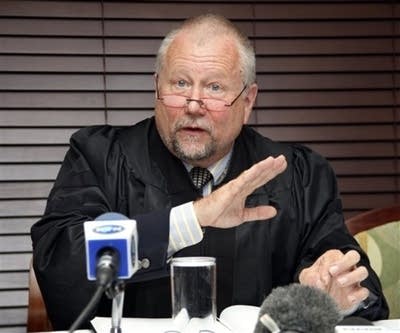Erlinder: US Embassy didn't help while he was jailed in Rwanda
Go Deeper.
Create an account or log in to save stories.
Like this?
Thanks for liking this story! We have added it to a list of your favorite stories.

By Jason Straziuso, Associated Press Writer
Nairobi, Kenya (AP) - Peter Erlinder, the St. Paul lawyer released from a Rwanda prison on medical grounds, credited America's Secretary of State with his release, but said Sunday the U.S. Embassy did not help him secure food or medicine while in prison.
Peter Erlinder, 62, said he had to sleep on a concrete floor without a blanket and without assistance from the embassy after his May 28 arrest in Kigali, Rwanda's capital.
The Minnesota law professor thanked U.S. Secretary of State Hillary Rodham Clinton for saying Rwanda shouldn't arrest lawyers but said embassy officials in Kigali and Nairobi have not helped much.
Turn Up Your Support
MPR News helps you turn down the noise and build shared understanding. Turn up your support for this public resource and keep trusted journalism accessible to all.
"My government insisted that I take my medications from my captors rather than bringing me medications directly," Erlinder told a news conference in Nairobi, his first public comments since his arrest. "It was impossible for them to arrange a doctor whom I would pay so that I wouldn't have to get my food and my medication from my captors."
A spokesman in Kigali said the U.S. embassy there offered regular assistance to the imprisoned lawyer.
"Embassy officials visited Erlinder every day and were in a constant touch with his family," embassy spokesman Edwina Sagitto said. "The Embassy also provided him food every day, and medicine from his doctors in the United States every day."

Erlinder did not outright say that he feared taking food from Rwandan authorities, but that was the implication. He added that it wasn't clear to him that "my own embassy was working in my interests." He did not elaborate.
A Rwandan judge ruled Thursday that Erlinder, a lawyer at the International Criminal Tribunal of Rwanda, should be freed from prison on medical grounds. Erlinder said he would soon go to the Mayo Clinic in Minnesota. He did not explain his health problems and declined to comment on his statements in a Rwandan court that he had attempted suicide in prison.
Rwanda's top prosecutor said after the medical release that he would continue his investigation of Erlinder, who said Sunday he would return to Rwanda to face charges if called by the court to do so. Erlinder has not yet been charged, but Rwandan authorities detained Erlinder on suspicion of what it calls minimizing the country's genocide.
That fact did not prevent Erlinder from making new statements that could anger the government of Rwanda, which has laws against minimizing the 1994 genocide in which hundreds of thousands of Rwandans, the vast majority of them ethnic Tutsis, were massacred by extremist Hutus over 100 days.
International accounts of the violence say at least 500,000 ethnic Tutsis and moderate Hutus were killed during Rwanda's genocide, which began after President Juvenal Habyarimana's plane was brought down in April 1994.
Erlinder has said there are two sides of the story, and said Sunday that there may be enough evidence to show that more ethnic Hutus died than Tutsis, a statement that could anger the government of President Paul Kagame.
"There is no question that there was a genocide in Rwanda. I've never denied it, and the prosecutors, after scouring all of my publications, were not able to find one time that I denied that there was a genocide against Tutsis," said Erlinder, a professor at William Mitchell College of Law in St. Paul.
"What I did say is that the story that this terrible genocide occurred after the assassination of (then Rwandan President Juvenal) Habyarimana was not something that had been long planned before the assassination, not because I say so but because that was the finding of the ICTR (International Criminal Tribunal of Rwanda)," he said.
Erlinder was in Rwanda to help with the legal defense of opposition leader Victoire Ingabire. Ingabire, a Hutu, wants to run for president in Aug. 9 elections, challenging incumbent President Kagame, a Tutsi. But she was arrested in April and charged with promoting a genocidal ideology. She was freed on bail but her passport was seized and she cannot leave Kigali.
Erlinder said he does not believe the conventional story line of the Rwandan genocide based on documents from the U.S. and U.N. that have recently been made public. He said the U.S. government has "systematically suppressed" evidence of the genocide.
Erlinder also said he can no longer act as an attorney for Ingabire. Choking back tears, he thanked his two Kenyan lawyers for traveling to Rwanda to defend him even though they could have been arrested.
He also complained that only one of his lawyers has been given a U.S. visa and said he will not leave Kenya until his other lawyer is also given a visa.
(Copyright 2010 by The Associated Press. All Rights Reserved.)
Dear reader,
Your voice matters. And we want to hear it.
Will you help shape the future of Minnesota Public Radio by taking our short Listener Survey?
It only takes a few minutes, and your input helps us serve you better—whether it’s news, culture, or the conversations that matter most to Minnesotans.




